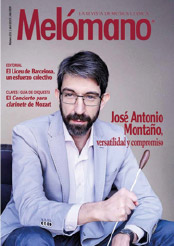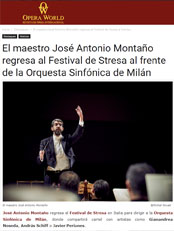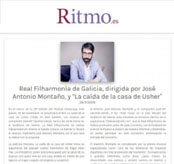THE CONCERT > THE CONDUCTOR
JOSÉ ANTONIO MONTAÑO, ORCHESTRA CONDUCTOR
The Madrilenian José Antonio Montaño is considered “among Spain´s orchestra conductors with the highest renown at the moment”, according to the specialized music press.
Trained by great masters such as Jesús López Cobos, Evelino Pidò, Pinchas Steinberg and Arturo Tamayo, he made name for himself in theaters and auditoriums of international prestige, performing all genres (opera, ballet, symphony and chamber music), and covering an extensive repertoire starting with his first baroque performance until utterly contemporary debuts.

Orchestras he has conducted
Among the numerous orchestras he has conducted are the Milan Symphony Orchestra, the Madrid Symphony Orchestra, the Orchestra of the Carlo Felice Theatre in Genoa, the Symphony Orchestra of Castilla y León, the Orchestra of the Community of Madrid, the Symphony Orchestra of Galicia, the Orchestra Accademia del Teatro La Scala in Milan, the Orchestra of the Royal Opera of Wallonia, the Symphony Orchestra of Saint-Étienne, Real Filharmonía de Galicia, Orquesta de Extremadura, Orquesta de Navarra, Orquesta de Navarra, l’Orchestre de l’Opera Royal de Wallonie, l’Orchestre Symphonique de Saint-Étienne, Real Filharmonía de Galicia, Orquesta de Extremadura, Sinfónica de Navarra, Sinfónica de la Región de Murcia, Orquesta de Córdoba, l’Orchestra Filarmonia Veneta and Orquesta Clásica Santa Cecilia among others.
He was chief conductor of the Orquesta Escuela de la Orquesta Sinfónica de Madrid (2003-2013) and of the Orquesta de la Universidad Carlos III de Madrid (2007-2009). In 2016 he founded the period-instrument orchestra La Madrileña, in which he has developed various recording, performance and musicological research projects in leading theatres, auditoriums and festivals with repertoires from the 18th century.
Best scenarios
He has conducted in the most important theatres in Spain such as the Teatro Real, Teatro de la Zarzuela, Teatro Monumental, Teatros del Canal, Teatro Español, Teatro María Guerrero, Fundación Juan March and Auditorio Nacional de Música de Madrid, Teatro Arriaga de Bilbao, Palacio de Festivales de Santander, Auditorio Baluarte de Pamplona, Teatro Romano de Mérida, Auditorio Ciudad de León, Teatro Principal de Mahón, Teatro Colón de La Coruña, Teatro Víctor Villegas de Murcia.
In Italy, at the Teatro La Scala in Milan, the Teatro Carlo Felice in Genoa, the Teatro Valli in Reggio Emilia, the Comunale in Ferrara, the Comunale in Treviso and the Palazzo Reale in Naples. In France, at the Grand Théâtre Massenet in Saint-Etienne. In Russia at the Alexandrinsky Theatre in St. Petersburg and in Belgium at the Opéra Royal de Wallonie-Liège.
His repertoire
Since 1998, with an extensive symphonic repertoire, he has also developed an intense activity in the operatic repertoire with titles ranging from the Baroque to the present day, such as: La vera costanza or Il mondo della luna by F. J. Haydn, Don Giovanni by W. A. Mozart, Il matrimonio segreto by D. Cimarosa, Il tutore burlato by V. Martín y Soler, L’Orfeo by C. Monteverdi, Dido & Aeneas by H. Purcell, La contadina by J. A. Hasse, La serva padrona by G. B. Pergolesi, Il sacrifizio di Abramo by C. de Rossi, Las labradoras de Murcia by A. Rodríguez de Hita, Il barbiere di Siviglia and Il viaggio a Reims by G. Rossini, Don Pasquale y Rita by G. Donizetti, Don Giovanni Tenorio by R. Carnicer, I Puritani by V. Bellini, La Bohème by G. Puccini, El gato con botas by X. Montsalvatge, Fantochines by Conrado del Campo or The Little Sweep by B. Britten, among the most outstanding.
In Italy at the Teatro La Scala in Milan, Teatro Carlo Felice in Genoa, Teatro Valli in Reggio Emilia, Comunale in Ferrara, Comunale in Treviso and Palazzo Reale in Naples. In France at the Grand Théâtre Massenet in Saint-Etienne. In Russia at the Alexandrinsky Theatre in St. Petersburg and in Belgium at the Opéra Royal de Wallonie-Liège.
Jose Antonio Montaño in the press
JOSÉ ANTONIO MONTAÑO, VERSATILIDAD Y COMPROMISO.
 El director madrileño José Antonio Montaño lleva veinte años subiéndose al podio de las mejores orquestas, teatros y festivales de nuestro país y de Europa… …¿Por qué crees que la crítica y la prensa te consideran como uno de los directores con mayor proyección del panorama nacional?…
El director madrileño José Antonio Montaño lleva veinte años subiéndose al podio de las mejores orquestas, teatros y festivales de nuestro país y de Europa… …¿Por qué crees que la crítica y la prensa te consideran como uno de los directores con mayor proyección del panorama nacional?…
EL MAESTRO JOSÉ ANTONIO MONTAÑO REGRESA AL FESTIVAL DE STRESA AL FRENTE DE LA ORQUESTA SINFÓNICA DE MILÁN
 José Antonio Montaño regresa al Festival de Stresa en Italia para dirigir a la Orquesta Sinfónica de Milán, donde compartirá cartel con artistas como Gianandrea Noseda, András Schiff o Javier Perianes.
José Antonio Montaño regresa al Festival de Stresa en Italia para dirigir a la Orquesta Sinfónica de Milán, donde compartirá cartel con artistas como Gianandrea Noseda, András Schiff o Javier Perianes.
El maestro Montaño debutó en 2019 en el prestigioso Festival italiano de Stresa dirigiendo con gran éxito el estreno absoluto de La chute de la Maison Usher de José M. Sánchez-Verdú. En esta ocasión, Montaño dirigirá el programa Double face per Carmen con música original de Timothy Brock para las películas mudas Carmen (1915) de Cecil B. DeMille y A Burlesque on Carmen (1915) de Charles Chaplin.
REAL FILHARMONÍA DE GALICIA, DIRIGIDA POR JOSÉ ANTONIO MONTAÑO, Y “LA CAÍDA DE LA CASA DE USHER”
 … “El maestro Montaño es considerado por la prensa musical especializada como “uno de los directores de orquesta españoles con más proyección del momento”. Formado junto a grandes referentes como Jesús López Cobos, ha desarrollado una exitosa y versátil carrera en teatros y auditorios de prestigio internacional a través de todos los géneros, abarcando un extenso repertorio que va desde el barroco a estrenos contemporáneos.
… “El maestro Montaño es considerado por la prensa musical especializada como “uno de los directores de orquesta españoles con más proyección del momento”. Formado junto a grandes referentes como Jesús López Cobos, ha desarrollado una exitosa y versátil carrera en teatros y auditorios de prestigio internacional a través de todos los géneros, abarcando un extenso repertorio que va desde el barroco a estrenos contemporáneos.
ORCHESTRA SINFONICA DI MILANO GIUSEPPE VERDI. FALLA, ALBÉNIZ- MONTAÑO, PRATS
“Dos palabras merece el joven director, pero que ya cuenta con un envidiable curriculum, José Antonio Montaño. Su dirección es de altura y prescinde de las inútiles redundancias que algunas composiciones son propensas a inspirar. Muy apreciable la precisión de toda la orquesta, difícil de obtener cuando se toca música que demanda ocho percusionistas que tienen que andar al unísono. Se necesita una óptima orquesta e igualmente un buen director, de lo contrario los errores son inevitables. Misión cumplida con pleno mérito…”
